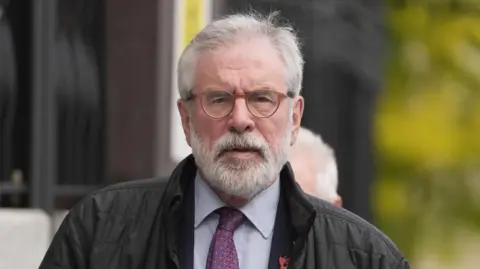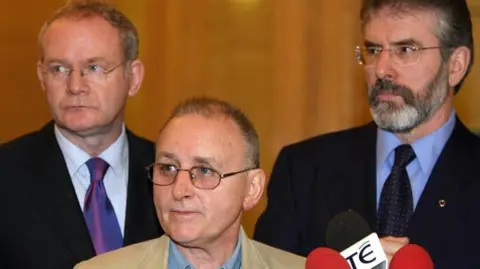Jury to be sent out on Thursday in Gerry Adams case
 PA Media
PA MediaThe jury in Gerry Adams' libel case against the BBC will begin considering their findings on Thursday morning.
Mr Justice Alexander Owens has now completed his recap of the evidence of all witnesses.
He said he did not think the jury of seven men and five women would be deliberating for long, as the issues were "quite easy" to determine. They have up to five questions to answer.
Mr Adams, 76, is suing the BBC over a story in which an anonymous contributor alleged he sanctioned the murder of Denis Donaldson in 2006. The former Sinn Féin leader denies any involvement.
Mr Adams alleges he was defamed in a Spotlight programme broadcast in 2016 and an accompanying online article.
The programme was seen by an estimated 16,000 viewers in Ireland.
Mr Adams was a TD for Louth at the time.
The trial at the High Court in Dublin heard four weeks of evidence from 10 witnesses, including Mr Adams and Jennifer O'Leary, the reporter who made the programme.
As part of his recap on Wednesday, Mr Justice Owens gave an overview of the evidence of Ms O'Leary, whom he said was the most important witness for the BBC's defence of fair and reasonable publication in the public interest.
He added that he was going to go through his remaining recap of evidence as "quickly as possible", comparing his summary to the pace of the Grand National horse race.
Addressing jurors, Mr Justice Owens said if they awarded damages to Mr Adams, they should base it on his recent and current reputation.
The jury will consider damages only if they find Mr Adams was defamed and they reject the BBC's fair publication defence.
Damages are for injury to reputation.
A central issue of the trial has been Mr Adams' alleged past as an IRA leader - a claim he has always rejected.
Mr Justice Owens said "a person's reputation can change" and the jury should "evaluate" it as of "2016 and now".
Who was Denis Donaldson?
 PA Media
PA MediaMr Donaldson was once a key figure in Sinn Féin's rise as a political force in Northern Ireland.
But he was found murdered in 2006 after it emerged he had worked for the police and MI5 inside Sinn Féin for 20 years.
In 2009, the Real IRA said it had murdered him.
Based on sources, Spotlight claimed the killing was the work of the Provisional IRA.
Mr Donaldson was interned without trial for periods in the 1970s and, after signing the Good Friday Agreement, Sinn Féin appointed him as its key administrator in the party's Stormont offices.
In 2005, Mr Donaldson confessed he was a spy for British intelligence for two decades, before disappearing from Belfast.
He was found dead in a small, rundown cottage in Glenties, County Donegal.
Who is Gerry Adams?
Mr Adams was the president of republican party Sinn Féin from 1983 until 2018.
He served as MP in his native Belfast West from 1983 to 1992 and again from 1997 until 2011 before sitting as a TD (Teachta Dála) in the Dáil (Irish parliament) between 2011 and 2020.
Mr Adams led the Sinn Féin delegation during peace talks that eventually brought an end to the Troubles after the signing of the Good Friday Agreement in 1998.
He was detained in the early 1970s when the government in Northern Ireland introduced internment without trial for those suspected of paramilitary involvement.
Mr Adams has consistently denied being a member of the IRA.
